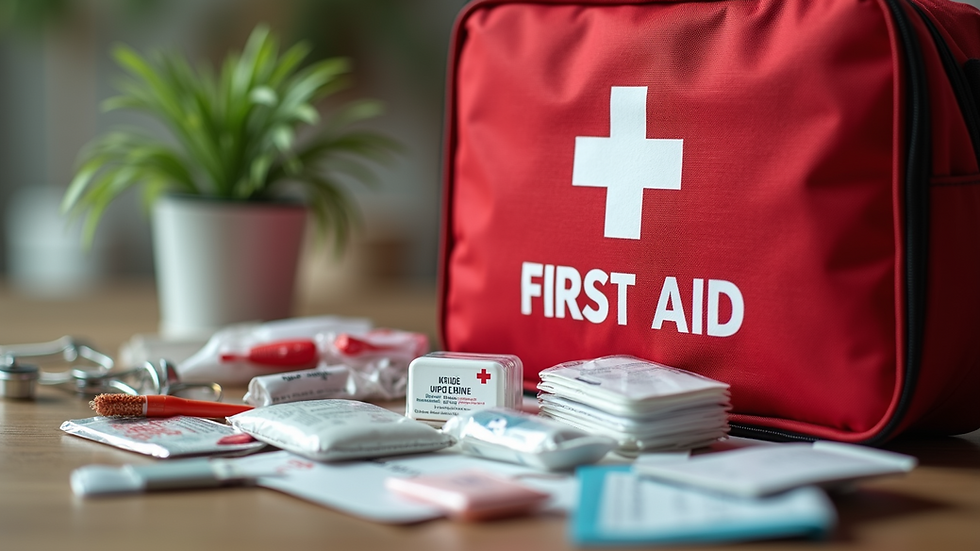The Importance of Knowing Basic First Aid Skills
- Aryeh Goldberg

- Jun 2
- 4 min read
In our unpredictable world, accidents can happen at any moment. Whether it's a minor injury like a cut or a more serious situation like a cardiac arrest, knowing basic first aid skills can make a significant difference in emergency situations. By being equipped with these essential skills, you can potentially save lives and improve outcomes for those involved.
Understanding Basic First Aid
Basic first aid involves immediate treatment given to an injured or ill person before professional medical help arrives. It can control bleeding, prevent infections, and ensure that the victim remains stable until emergency services can take over. Understanding basic first aid helps individuals respond confidently and correctly in various emergency scenarios.
It’s not just about physical injuries. First aid skills can also cover how to handle emotional crisis situations, like panic attacks. When someone is in distress, your calmness and knowledge can be incredibly comforting, making it easier for them to cope.

Why Basic First Aid Skills Matter
Having basic first aid skills empowers individuals to act swiftly in emergencies. According to the American Red Cross, nearly 70% of people in the U.S. would not know how to perform CPR on someone in need. This statistic highlights the gap in awareness and preparedness. Knowing basic first aid can bridge that gap and provide crucial support.
Moreover, many workplaces, schools, and public places emphasize the importance of first aid training. It can lead to quicker recovery times for injuries, as early intervention often helps prevent complications. If enough individuals are trained in basic first aid, entire communities become more resilient when facing emergencies.

Life-Saving Techniques Everyone Should Know
There are several simple yet effective first aid techniques that everyone should practice. Here are a few:
CPR (Cardiopulmonary Resuscitation)
CPR is a lifesaving technique useful in emergencies such as cardiac arrest. It involves chest compressions, which help maintain blood flow to vital organs. The American Heart Association recommends everyone learn the steps of CPR.
Choking Relief
Choking is a critical situation where someone cannot breathe because their airway is blocked. The Heimlich maneuver is a technique that can help clear the obstruction. This maneuver involves quick thrusts to the abdomen, pushing air from your lungs to force the object out.
Dressing Wounds
For injuries such as cuts or scratches, knowing how to properly clean and dress a wound is essential. This prevents infections and promotes faster healing. Use clean water, mild soap, and a sterile bandage to protect the injured area.
Treating Burns
Burns can occur from various sources, including fire, chemicals, and electricity. Running cool (not cold) water over a burn for 20 minutes can help soothe the area and lessen permanent damage. Always seek medical attention for severe burns.
Understanding these techniques can help you manage emergencies effectively. Practical training in these first aid skills is available through various organizations that offer first aid courses tailored for different needs.

First Aid Kits: Your First Line of Defense
Having a well-stocked first aid kit is essential for handling emergencies. You should keep a first aid kit at home, in the car, and at work. Essential items to include in your kit are:
Adhesive bandages of various sizes
Sterile gauze and adhesive tape
Antiseptic wipes and ointments
Tweezers and scissors
Disposable gloves
Instant cold packs
Regularly check your first aid kit to ensure everything is up to date. Replace expired items and replenish supplies after use. Knowing how to use each item properly can make your kit even more effective.
The Value of Continuous Learning
While knowing basic first aid is beneficial, it is also essential to stay updated. Medical protocols and techniques change over time. Therefore, many organizations recommend refreshing your skills every two years or so.
Consider participating in community workshops or enrolling in classes at local healthcare centers. This can be an engaging way to meet new people while learning valuable skills. Learning from professionals can also help clarify any questions you might have.
The Role of Employers in First Aid Training
Employers play a crucial role in promoting first aid awareness among their employees. Providing training sessions on basic first aid can create a safer work environment, showing that they care about the health and well-being of their staff.
In some countries, workplaces are required by law to have trained first aiders on site. Offering regular first aid courses not only enhances workplace safety but also builds employee confidence.
Empowering Your Community
When everyone in a community is trained in basic first aid, the entire community benefits. Knowing that your neighbors may be equipped to respond properly to emergencies can provide peace of mind.
Engage in community events that focus on health and safety. Start conversations about the importance of first aid companionship. This collaborative approach helps spread awareness and encourages others to get involved.
Every person you help with first aid strengthens the community's safety net. It can spark change and motivate more people to learn these essential skills.
Take Action Today
Now that you understand the importance of basic first aid skills, it's time to act! Start small by familiarizing yourself with first aid techniques.
Consider enrolling in a first aid course to gain practical experience. Read materials, watch instructional videos, or even practice with family members. Empower yourself, so when emergencies arise, you can respond with confidence and clarity.
Knowing basic first aid skills is not just a personal benefit; it has far-reaching implications for your family, workplace, and broader community. Take the first step toward becoming a more knowledgeable, responsible citizen today!





Comments